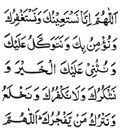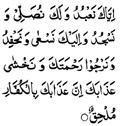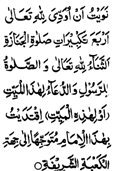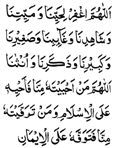(From The Elementary
Teachings of Islam by His Exalted Eminence Maulana Mohammed Ahdul Aleem
Siddiqui)
9. Wajib-ul-witr
1.
Q. When is Wajib-al-witr
prayer
to be offered?
A. It should be offered
after the Sunnatul-mu'akkadah of Salatul-'Isha.
2.
Q. Of how many rak'ats
does it consist?
A. It consists of
three rak'ats.
3.
Q. How does it differ
from other prayers?
A. It differs from
other prayers in this respect, viz., that, in the third rak'at, before
one bows down for the performance of ruku', one should say: "Allahu
Akbar", raising the hands up to the ears and after placing them in
the former position below the navel, one should recite the following du'a
called Dn'aal Qunut:
Allahumma inna
nas-ta'eenuha wa nastagh-firuka wa nu'minu bika wa natawakkalu 'alaika
wa nusni 'alaikal khaira wa nashkuruka wa la nakfuruka wa nakhia'u wa natruku
manyyafjuruka; Allahumma iyyaka na'budu wa laka nusalli wa nasj'udu wa
ilaika nas'aa wa nah-fidu wa narjoo rahmaataka, wa nakhsha azataka inna
'aza baka bil kuffari mulhiq.


O Allah! we beseech
Thy help and ask Thy pardon and believe in Thee and trust in Thee, and
we praise Thee in the best manner and we thank Thee and we are not ungrateful
to Thee, and we cast off and foresake one who disobeys Thee. O Allah! Thee
alone do we serve and to Thee do we pray and make obeisance and to Thee
do we flee and we are quick (in doing so), and we hope for Thy mercy and
fear Thy chastisement; surely Thy chastisement overtakes the unbelievers'.
10. Salat-ul-janazah
(funeral prayers).
1.
Q. How is Salat-ul-janazah
offered?
A. Salat-ul-janazah
is offered in the congregation as follows:
(1) The body of
the deceased is placed in a coffin with its face turned towards the Ka'ba
and the Imam standing by its side with the intention (niyyat)
of offering Salat-ul-janazah for that particular dead person raises
both hands upto the ears and says "Allahu Akbar", the congregation
following his lead. The usual niyyat for the Salat-ul-janazah
is:
Navaitu an uwaddiya lillahi
ta'ala araba'a takbiraati salatiljanazati, ath-thanaau lillahi ta'ala was-salatu
lirrasooli wad-du'au lihazal mayyiti (lihazihil mayyiti, in case the
deceased is a female), iqtadaitu bihaz al-lmami mutawajjihan ila jihatil
Ka'ba-tish-Sharifah.

'I intend to offer for Allah,
the Sublime, four takbirs of funeral prayer, Praise for Allah, the
Sublime, and Blessings (of Allah) for the Apostle and prayer for this deceased
person; I adopt the lead of this Imam, with my face turned in the
direction of the honoured Ka'ba.'
(2) The Imam
and
the congregation then join their hands below the navel and recite:
Subhanak - Allahumma
wa bihamdika wa tabarakasmuka wa ta'ala jadduka wa jalla thana'uka wa la
ilaha ghairuka.

(3) The Imam
and
the congregation then say "Allahu Akbar", (this time without raising
their hands), and recite the salawat as given in (1) item of 3rd
part of question (1) in the section on "Performance
of Prayer".
(4) The Imam and the
congregation then say "Allahu Akbar," as in (2)
and recite:
(a) If the deceased
had attained the age of puberty, then the following Du'a:
Allahummaghfir li hayyina
wa mayyatina wa shahidina wa gha'ibina wa saghirina wa kabirina wa zakarina
wa unthana; Allahumma man ahyaitahu minna fa-ahyihee 'alal Islam, wa man
tawaffaitahu minna fatawaffahu 'alal Iman.

'O Allah ! Pardon our living
and our dead, the present and the absent, the young and the old, the males
and the females. O Allah! he (or she) to whom Thou accordest life, cause
him to live in the observation of Islam, and he to whom Thou givest death,
cause him to die in the state of Iman.'
(b) If the deceased
is a minor and a boy, then the following Du'a:
Allahummaj'alhu lana
artan waj'alhu lana jran wa zukhran waj 'alhu lana shafi'an wa mushaffa'an.


O Allah! make him our forerunner,
and make him, for us, a reward and a treasure, and make him, for us, a
pleader, and accept his pleading.
(c) If the deceased
is a minor girl, then the following Du'a:
Allahummaj'alha lana
fartan waj'alha lana ajran wa zukhran waj'alha lana shafi'atan wa mushaffa'atan.

'O Allah " make her our fore-runner,
an make her, for us, a reward and a treasure, and make her, for us, a pleader
and accept her pleading.
(5) "Then the Iman
and
the congregation say, "Allahu Akbar" as in (3) [link to ddd]. Then
turning their faces alone to the right they say: "Assalamu 'alaikum
wa rahmatollah". Then they turn their faces (alone) to the left and
say: "Assalaamu 'alaikum wa rahmatullah'.
11.
The
Curtailment of Obligatory Prayers.
1.
Q. When should one curtail
the obligatory prayer ?
A. When one is travelling
with the intention of proceeding forty-eight miles or more from the home,
one should offer two rak'ats of fard prayers for those which
comprise four, and continue to do the same after one's arrival at a destination.
If one does not intend to prolong his or her stay there for fifteen days
or more.
12. Forbidden
Times for Prayers
1.
Q. At what time is one
prohibited to offer Fard, Sunnat or Nafl prayers ?
A. One is forbidden
to offer either Fard, Sunnat or Nafl prayers at:
(1) The time when
the Sun is rising.
(2) The time when the Sun
is at its zenith.
(3) The time when the Sun
is setting.
2.
Q. Are there any other
times when one should not offer the Nafl prayers?
A. Yes. One should
not offer Nafl prayers during:
(1) The interval
between the offering of the Fard of Salatul-Fajr and the
rising of the sun.
(2) After the Iqamat
is called for any congregational prayer at a mosque.
(3) The time between the
offering of the Fard of Salatul-'Asr and the setting of the
sun.
(4) The time between the
setting of the sun and the offering of the Fard of Maghrib
prayers.
(5) The time between the
Imam's
getting up from his place for delivering the Khutba, i.e., the sermon,
and the completion of Friday congregational prayers.
(6) At the time of any Khutba,
e.g., Friday, 'Id, etc.
(7) The time between the
Fajr
prayer and the Id prayers.
(8) After the 'Id
prayers at the premises where the same have been offered.
(9) At the time of Hajj
in 'Arafat after the Zuhr and 'Asr prayers are offered together.
(10) The time between the
Maghrib and 'Isha prayers at Muzdalifa.
(11) When there is very
little time left for offering the Fards of any of the daily prayers.
(12) When one feels the
need to answer a call of nature.
13. Salatul-jummat'a
(Friday
Prayers).
1.
Q. What is Salat-al-Jamm'a?
A. It is a congregational
prayer only and cannot be offered alone. Consequently, an Imam (i.e.,
leader) is necessary to lead the prayers. The Imam first of all
delivers a Khutba in two parts consisting of praise to Allah and
prayers of blessing for the Holy Prophet, and some admonition to the congregation.
He then prays to Allah for the welfare of all Muslims. After that he leads
two
rak'ats of the Fard of Jumm'a and all other follow him,
as usual in congregational prayers.
2.
Q. Who should be chosen
to lead the prayers?
A. The one most conversant
with Islamic theology among those present should be requested to lead the
prayers.
3.
Q. How is the congregational
prayer offered?
A. The Imam stands
in front of the congregation facing the direction of the Ka'ba, and all
the other worshippers stand in lines behind him and follow his lead, i.e.,
they stand when he stands, perform
ruku when he does it, and so
on.
4.
Q. Should a person offering
his prayers with a congregation repeat all the requisite recitations?
A. Yes. One should
recite everything excepting the Opening Chapter of the Holy Qur'an followed
by some other passage from it which the Imam recites on behalf of the congregation.
Notes:
1.
Q. What Prayers are offered
in congregation in the daily Prayers?
A. Only the Fard
of
each Prayer is offered in a congregation, and not Sunnat or Nafl.
2.
Q. What should one do
if one misses the congregation for any Prayer (Fard)?
A. If one misses
congregation for any prayer, one should offer it alone or, if possible,
join or arrange to have another congregation; but if one misses the congregation
of Salat-ul-Jumu'a one should offer by oneself the usual Fard
of
Salat-uz-Zuhr.
Next Page
|





